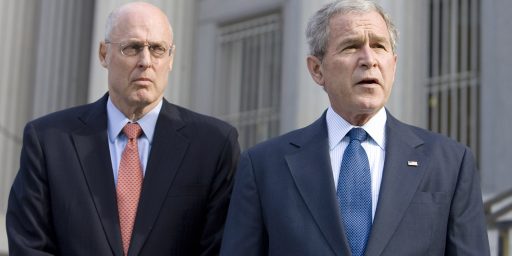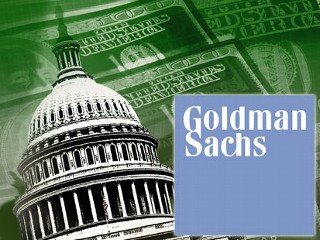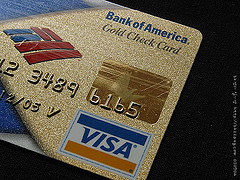Krugman on Lehman
For the most part a decent article. No really. I know Krugman usually writes spittle flying, eyes popping and vein bulging articles talking about the evils of the Bush Administration, but this time he stepped away from that, for the most part, and wrote a fairly good article that goes over the situation.
To understand the problem, you need to know that the old world of banking, in which institutions housed in big marble buildings accepted deposits and lent the money out to long-term clients, has largely vanished, replaced by what is widely called the “shadow banking system.” Depository banks, the guys in the marble buildings, now play only a minor role in channeling funds from savers to borrowers; most of the business of finance is carried out through complex deals arranged by “nondepository” institutions, institutions like the late lamented Bear Stearns — and Lehman.
The new system was supposed to do a better job of spreading and reducing risk. But in the aftermath of the housing bust and the resulting mortgage crisis, it seems apparent that risk wasn’t so much reduced as hidden: all too many investors had no idea how exposed they were.
The lack of information makes it harder for people to make the correct decisions and in the end this can have large effects on markets. The classic and simple example is the Akerlof lemon model where Akerlof’s simple model of used cars showed how, absent good information, the only market for used cars is with lemons. Now imagine a complex and byzantine financial system, could there be problems with information asymetries that could lead to the marget doing something really…well bad? Sure.
And as the unknown unknowns have turned into known unknowns, the system has been experiencing postmodern bank runs. These don’t look like the old-fashioned version: with few exceptions, we’re not talking about mobs of distraught depositors pounding on closed bank doors. Instead, we’re talking about frantic phone calls and mouse clicks, as financial players pull credit lines and try to unwind counterparty risk. But the economic effects — a freezing up of credit, a downward spiral in asset values — are the same as those of the great bank runs of the 1930s.
And here’s the thing: The defenses set up to prevent a return of those bank runs, mainly deposit insurance and access to credit lines with the Federal Reserve, only protect the guys in the marble buildings, who aren’t at the heart of the current crisis. That creates the real possibility that 2008 could be 1931 revisited.
I don’t think this is that likely and Krugman is perhaps engaging in more than a little hyperbole, maybe a tad hysterical. But this could be a bad thing for the economy. However, as Krugman notes,
Now, policy makers are aware of the risks — before he was given responsibility for saving the world, Ben Bernanke was one of our leading experts on the economics of the Great Depression.
Being well aware of what happened in 1931, what went wrong and what should have been done, but wasn’t is a good thing. Which is sort of amusing in that Krugman has at least partially refuted his hysterics above.
So over the past year the Fed and the Treasury have orchestrated a series of ad hoc rescue plans. Special credit lines with unpronounceable acronyms were made available to nondepository institutions. The Fed and the Treasury brokered a deal that protected Bear’s counterparties — those on the other side of its deals — though not its stockholders. And just last week the Treasury seized control of Fannie Mae and Freddie Mac, the giant government-sponsored mortgage lenders.
But the consequences of those rescues are making officials nervous. For one thing, they’re taking big risks with taxpayer money. For example, today much of the Fed’s portfolio is tied up in loans backed by dubious collateral. Also, officials are worried that their rescue efforts will encourage even more risky behavior in the future. After all, it’s starting to look as if the rule is heads you win, tails the taxpayers lose.
There is alot to be said for the problem of moral hazard that comes from continually bailing out financial institutions that fail due to stupid decision making. And the story here is somewhat interesting: the Bear Stearns and Freddie Mac/Fannie Mae bailouts were to give the market participants time to evaluate their risk exposure and take the appropriate actions.
However, there is another potential problem that market participants expect a bailout and hence don’t take the appropriate actions. Afterall if ther is a bailout then the downside is limited, and if there is no need for a bailout–i.e. Lehman finds a buyer and the market bounces back the payoff could be good.
But Henry Paulson, the Treasury secretary, was adamant that he wouldn’t sweeten the deal by putting more public funds on the line. Many people thought he was bluffing. I was all ready to start today’s column, “When life hands you Lehman, make Lehman aid.” But there was no aid, and apparently no deal. Mr. Paulson seems to be betting that the financial system — bolstered, it must be said, by those special credit lines — can handle the shock of a Lehman failure. We’ll find out soon whether he was brave or foolish.
I think either way it is the right move. If it is “foolish” to use Krugman’s terms then it is as I noted above, people were expecting a bailout and didn’t get it. This, in the longer run, is a good thing. It tells financial institutions, “Look, you can’t just treat this like monopoly money. If you screw up it is going to hurt, both you, your employees, and others as well, so get your heads out of your butts.” Continiously bailing these institutions out creates a situation that Krugman has outline, heads I win, tails the taxpayer loses. Great gig if you can get it.
The real answer to the current problem would, of course, have been to take preventive action before we reached this point. Even leaving aside the obvious need to regulate the shadow banking system — if institutions need to be rescued like banks, they should be regulated like banks — why were we so unprepared for this latest shock? When Bear went under, many people talked about the need for a mechanism for “orderly liquidation” of failing investment banks. Well, that was six months ago. Where’s the mechanism?
And here Krugman turns into some pie-in-the-sky type. Really? Six months? Please. Government is slow, cumbrsome, and prone to responding in a clumsy ham fisted manner. This is something that is actually going to take an act of Congress. And guaranteed if government did something fast it would very likely be as bad as doing nothing perhaps even worse.
And so here we are, with Mr. Paulson apparently feeling that playing Russian roulette with the U.S. financial system was his best option. Yikes.
And here is the problem with Krugman: you can’t win with him. You really are damned if you do and damned if you don’t. With Krugman he always has his cake and eats it too. Okay, so about the first half to two-thirds fo the article was decent.






I wonder if those responsible will pay a price? Lehman’s CEO just a banked a $22 million bonus in the last year. Is he really going to hurt if that bonus isn’t there this year? How about the Board of Directors? Will the group most responsible actually be responsible? I doubt it.
It goes back to the monopoly money statement. To many in this business it is fake money. It’s abstract figures, “phone calls and mouse clicks”. I don’t think any Lehman Bros. execs are going to lose their house over this. Fact is they will all walk away relatively unscathed.
Steve how dare you question the compensation packages of our wise and selfless corporate leaders? Why do you hate America dude?
Considering the average compensation package for a Wall Street investment banker last year was about $600k. Can I get paid half that price if I only lose half as much money as they did?
Steve, I guess I am most surprised that this seems to have been yet another big surprise to the super smart people in the investment community who are supposed to be on top of all this sort of thing. Perhaps the real problem isn’t that risk had been hidden so much as it was assumed to have vanished altogether. Those are some sandy foundations on which these big structures have been built.
Anyway, it is refreshing to hear that Lehman will not be bailed out. One of the oft-overlooked features of capitalism is that businesses that screw up go out of business. Maybe the silver lining here will be folks thinking a little more conservatively about debt and risk.
Anjin-san,
True capitalist understand no corporate exec is or should be selfless. The job is to lead the company to returns and security for the stockholders. Many of these CEOs do nothing of the sort. For short term profits they have endangered long term security. The Boards have conveniently looked the other way.
I love America and in America seeking corporate profits the correct way is good. Screwing your own company is bad.
Steve,
I think we are on the same page on this one. Seems to me that “leaving this job with buying an island money regardless of consequences” is #1 to a lot of this generation’s CEOs.
Welcome to the real world of unintended consequences.
Here on my right, please allow me to introduce you to those that practice greed for personal gain based on that good old Harvard B-school model of the ‘only thing that counts is what have you done for me this last quarter’, ‘long term consequences be damned’, and ‘I got mine, yours is your problem’.
On my left, the BDS media that have been working hard for the last couple of years to assure that the economy had a significant downturn just before the election in support of the Dems. What a fine group of folks all!
On behalf of the American people that will pay dearly and long for this mess you have caused I want to thank you. May you each die a slow death of 10,000 fire ant stings as you are staked-out naked over a vat of sweet clover honey.
Its a ……… vast…….. left……..wing…………. conspiracy!
Careful Spoker, there is a guy with a straight jacket catching up with you.
Anjin-san,
We’re on the same page about a lot of things. Right is right, wrong is wrong, we debate the few things in the middle. In the long run we both want what is good for our country, our kids, and ourselves.
I was involved with WallSt. when the transition began between the stodgy old finance world and modern times. Then Sears bought Dean Witter and sales, not investment, became the new criteria. New Brokers were trained to just get a new book (clients) when you burned out the old ones. New products became the seduction and the slowness of the old banks to react to the Carter inflation allowed millions of new clients to be captured by much higher CD prices etc. Once captured then new attractive (riskier?) product turned what was once savings account millions into stocks, bonds and option trading money. The end result of that non-conservative game is now being felt by all.
When Bill Clinton and the Republican controlled Congress overturned the Glass-Steagall Act in 1999, it set these events in motion. Regardless of a person’s capitalist or socialist leanings, it has to be understood that the greed of bankers must be corralled, or else they risk ruining the economy as they always do when allowed to roam free.